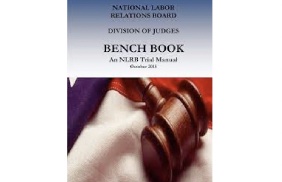Office of Public Affairs
202-273-1991
[email protected]
www.nlrb.gov
Washington, D.C – The Judges Division of the National Labor Relations Board (NLRB) has issued an updated Bench Book, which replaces the last update issued in January 2022. The Bench Book serves as an NLRB trial manual and is designed to provide NLRB administrative law judges (ALJs) with a reference guide during hearings. It is also a useful tool for practitioners before the Board because it sets forth Board precedent and other rulings and authorities on certain recurring procedural and evidentiary issues that may arise during hearings.
This year’s edition includes citations to numerous additional Board and court decisions. It also includes additional citations to helpful treatises on federal evidence and procedure that are available on either Westlaw or LEXIS. Finally, it includes several new sections, including a section on using special masters to address subpoena production disputes and a section on including non-disparagement and confidentiality provisions in settlement agreements.
The 2023 edition was edited by ALJ Jeffrey Wedekind, who has served as editor since 2010, and ALJs Sharon Steckler and Mara-Louise Anzalone, as associate editors. It also includes a foreword by Chief ALJ Robert Giannasi describing the Bench Book’s history and purpose.
Established in 1935, the National Labor Relations Board is an independent federal agency that protects employees from unfair labor practices and protects the right of private sector employees to join together, with or without a union, to improve wages, benefits and working conditions. The NLRB conducts hundreds of workplace elections and investigates thousands of unfair labor practice charges each year.

NLRB Just Issued An Updated ALJ Bench Book – Why You Should Read It
The National Labor Relations Board (NLRB), like many federal agencies, has its own division of administrative law judges (ALJs) that preside over cases brought to the agency. In fact, the NLRB takes most of its actions through individual case adjudication vs. administrative rulemaking.
On May 12, 2023, the NLRB announced that its Judges Division has issued an updated Bench Book, which provides guidance to the board’s administrative law judges in terms of running unfair labor practice hearings. Unfair labor practice hearings are trials in which employers and unions defend themselves against alleged violations of the National Labor Relations Act.
The NLRB’s announcement describes the Bench Book as follows: “The Bench Book serves as an NLRB trial manual and is designed to provide NLRB administrative law judges (ALJs) with a reference guide during hearings. It is also a useful tool for practitioners before the Board because it sets forth Board precedent and other rulings and authorities on certain recurring procedural and evidentiary issues that may arise during hearings.”
The topics in the Bench Book are far-reaching. They include guidance on everything from pleadings to subpoenas to evidentiary issues to settlement procedures.
The agency’s press release summarized the updates: “This year’s edition includes citations to numerous additional Board and court decisions. It also includes additional citations to helpful treatises on federal evidence and procedure that are available on either Westlaw or LEXIS. Finally, it includes several new sections, including a section on using special masters to address subpoena production disputes and a section on including non-disparagement and confidentiality provisions in settlement agreements.”
Anyone who handles charges before the NLRB should consider reviewing the Bench Book prior to any proceedings before an administrative law judge to ensure they are up to date on this latest guidance. Reviewing the agency’s manuals on case handling also is a best practice. Doing so can give you a head start on reviewing case law and precedent the NLRB believes to be relevant on key issues, help inform your litigation and evidentiary strategy, and generally help hone the themes and points that may be critical to your case. If you’ve never reviewed one, it may be worth your time.
Source:





